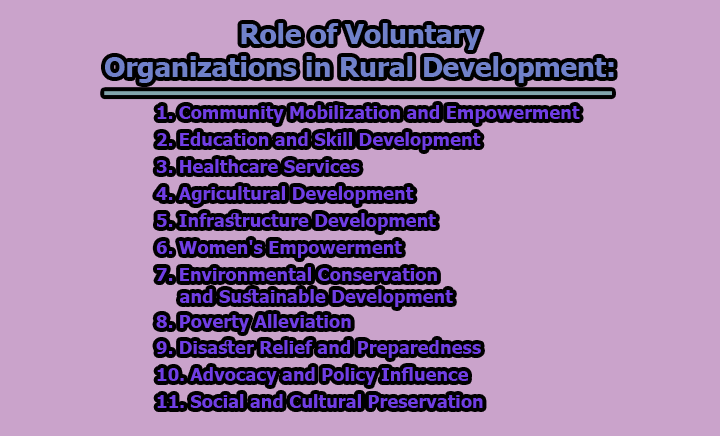Rural development is a multifaceted process aimed at improving the quality of life for people living in rural areas. It encompasses economic, social, and environmental improvements that contribute to the overall well-being of rural communities. Voluntary organizations, often referred to as Non-Governmental Organizations (NGOs) and Community-Based Organizations (CBOs), play a crucial role in rural development. These organizations are driven by a sense of social responsibility and a commitment to serving the needs of rural populations. In this article, we will explore the role of voluntary organizations in rural development.
Understanding Rural Development:
Before delving into the role of voluntary organizations, it’s important to understand the concept of rural development. Rural development is a complex and ongoing process that seeks to address the unique challenges and opportunities present in rural areas. It encompasses economic, social, and environmental dimensions, and its goals include poverty reduction, improved living standards, infrastructure development, and sustainable natural resource management.
Rural areas are often characterized by lower income levels, limited access to basic services, and a reliance on agriculture as a primary source of livelihood. Challenges such as inadequate healthcare, education, and employment opportunities are common in rural communities. To address these issues and promote balanced regional development, voluntary organizations play a pivotal role.
Role of Voluntary Organizations in Rural Development:
1. Community Mobilization and Empowerment: Voluntary organizations are instrumental in mobilizing rural communities and empowering them to take control of their development. They engage in capacity-building initiatives that equip individuals and communities with the knowledge and skills needed to address their own challenges. This empowerment often takes the form of organizing community meetings, providing training on leadership and problem-solving, and fostering a sense of ownership over development projects.
Empowered communities are more likely to identify their priorities, set goals, and work collectively to achieve them. Voluntary organizations facilitate this process, leading to more sustainable and locally-driven development initiatives.
2. Education and Skill Development: Education is a fundamental driver of rural development. Voluntary organizations often establish schools, vocational training centers, and adult education programs in rural areas. These educational initiatives enhance the human capital of rural communities, making them more competitive in the job market and equipping them with the skills needed for various livelihood opportunities.
Moreover, voluntary organizations frequently promote education on critical issues such as healthcare, hygiene, and sustainable agriculture, improving the overall quality of life in rural areas.
3. Healthcare Services: Access to quality healthcare services is a critical aspect of rural development. Voluntary organizations often set up health clinics, mobile medical units, and health education programs to improve healthcare access in remote areas. They provide healthcare services, including preventive care, maternal and child health, and treatment for common diseases.
Furthermore, they play a pivotal role in creating awareness about health issues, promoting healthy behaviors, and ensuring that rural populations have access to vital medical resources. This not only leads to better health outcomes but also contributes to increased productivity in rural communities.
4. Agricultural Development: Agriculture is the backbone of most rural economies. Voluntary organizations work with farmers and agricultural communities to enhance their agricultural practices, increase productivity, and improve livelihoods. They provide training on modern farming techniques, promote sustainable agricultural practices, and facilitate access to agricultural inputs like seeds, fertilizers, and equipment.
Additionally, voluntary organizations often assist in marketing and value addition, connecting rural farmers to larger markets and helping them obtain fair prices for their products. Through these efforts, voluntary organizations contribute to poverty reduction and food security in rural areas.
5. Infrastructure Development: Rural areas often lack basic infrastructure such as roads, electricity, and clean drinking water. Voluntary organizations take on the task of planning, funding, and implementing infrastructure projects that can transform rural communities. They build roads, bridges, and other transportation links that improve connectivity and access to markets. They also work on electrification projects, bringing electricity to areas that were previously without power.
Access to clean drinking water is a crucial aspect of rural development, and voluntary organizations often construct water supply systems, such as wells, boreholes, and community taps. These improvements enhance the quality of life and encourage economic activities in rural areas.
6. Women’s Empowerment: Women play a significant role in rural development, and voluntary organizations often focus on women’s empowerment as a key strategy. Voluntary organizations run programs aimed at improving the status of women in rural communities, including education and skill development, access to credit and microfinance, and training in income-generating activities.
By empowering women, voluntary organizations not only uplift individual lives but also contribute to the development of entire communities. Women often invest their earnings in their families, leading to improved living standards, education, and healthcare for all family members.
7. Environmental Conservation and Sustainable Development: Sustainable rural development involves the responsible use of natural resources and the protection of the environment. Voluntary organizations often engage in environmental conservation efforts, including afforestation and reforestation projects, watershed management, and sustainable agricultural practices.
Voluntary organizations raise awareness about the importance of environmental conservation and work with rural communities to implement practices that reduce environmental degradation. By promoting sustainable land use and resource management, they contribute to the long-term viability of rural areas.
8. Poverty Alleviation: Poverty is a significant challenge in rural areas, and voluntary organizations are actively involved in poverty alleviation efforts. They provide financial support and access to credit through microfinance programs, helping rural residents start small businesses or invest in their farms. Additionally, they often create income-generating opportunities through skills training and employment programs.
By addressing poverty, voluntary organizations not only improve the economic conditions of rural populations but also enhance their overall well-being, including access to healthcare, education, and social services.
9. Disaster Relief and Preparedness: Rural areas are often more vulnerable to natural disasters such as floods, droughts, and earthquakes. Voluntary organizations are essential in providing disaster relief, including emergency food, shelter, and medical assistance to affected communities. They also play a significant role in disaster preparedness, conducting training and awareness programs to help rural residents respond effectively to emergencies.
10. Advocacy and Policy Influence: Voluntary organizations often serve as advocates for rural communities, representing their interests and concerns to governments and other stakeholders. They engage in policy advocacy and lobbying efforts to influence policies and decisions that affect rural development. By acting as intermediaries between rural communities and policymakers, they ensure that the needs of rural populations are taken into account in the formulation of development policies and strategies.
11. Social and Cultural Preservation: Rural areas often have unique cultural traditions and identities that are worth preserving. Voluntary organizations are involved in cultural preservation efforts, supporting activities such as traditional music and art, local festivals, and the documentation of indigenous knowledge. These efforts help maintain the cultural richness of rural communities and can also serve as a source of income through tourism and cultural exchange programs.
Challenges Faced by Voluntary Organizations in Rural Development:
While voluntary organizations play a crucial role in rural development, they also face several challenges that can hinder their effectiveness:
- Resource Constraints: Many voluntary organizations operate with limited financial resources, which can make it difficult to fund large-scale development projects. This constraint may affect their ability to reach a wider rural population.
- Sustainability: The sustainability of development initiatives can be challenging, especially in areas with limited resources and infrastructure. Voluntary organizations often struggle to ensure that the projects they initiate continue to benefit rural communities after their intervention.
- Local Engagement: Building trust and engagement with rural communities can be time-consuming and complex. Voluntary organizations must work to understand the unique needs and cultural contexts of the communities they serve.
- Government Regulations: Government regulations and bureaucracy can pose challenges for voluntary organizations, particularly when it comes to obtaining necessary permissions, licenses, and approvals for their projects.
- Capacity Building: Building the capacity of local staff and communities to take over and manage development initiatives can be a long-term and resource-intensive process.
- Coordination and Collaboration: Effective coordination and collaboration among various stakeholders, including other NGOs, government agencies, and international organizations, are often necessary for successful rural development projects.
- Resistance to Change: Some rural communities may be resistant to adopting new practices or technologies, making it challenging to implement sustainable development initiatives.
Case Studies of Successful Voluntary Organizations in Rural Development:
To illustrate the impact of voluntary organizations in rural development, let’s examine a few case studies from different parts of the world.
- Grameen Bank, Bangladesh: The Grameen Bank, founded by Muhammad Yunus in Bangladesh, is a pioneering example of microfinance institutions that have revolutionized rural development. It provides small loans to impoverished individuals, particularly women, to help them start small businesses and improve their economic status. The Grameen Bank’s approach has not only lifted millions of people out of poverty but has also empowered women and promoted financial inclusion in rural areas.
- BRAC, Bangladesh: BRAC, originally known as the Bangladesh Rural Advancement Committee, is one of the world’s largest NGOs. It operates in multiple countries and has played a crucial role in rural development in Bangladesh. BRAC’s initiatives include education, healthcare, microfinance, and agricultural support. Through its extensive reach and innovative programs, BRAC has contributed to poverty reduction, increased access to education, and improved healthcare in rural Bangladesh.
- Self-Employed Women’s Association (SEWA), India: SEWA, based in India, is a trade union and voluntary organization that focuses on empowering women in the informal labor sector. It provides a wide range of services, including microfinance, healthcare, childcare, and skill development. SEWA’s efforts have transformed the lives of countless women, enabling them to earn a decent livelihood and access essential services.
- Barefoot College, India: The Barefoot College, located in the village of Tilonia, Rajasthan, India, is a unique example of a voluntary organization dedicated to rural development. It focuses on skill development and education for rural women, particularly in the field of solar engineering. Barefoot College trains illiterate and semi-literate women from various parts of the world to become solar engineers, who then return to their villages to install and maintain solar power systems. This initiative not only brings clean energy to rural areas but also empowers women and reduces dependence on traditional energy sources.
- Heifer International, Global: Heifer International is a global voluntary organization that focuses on ending hunger and poverty by providing livestock and agricultural training to communities in need. They work with rural communities to provide animals like cows, goats, and chickens, along with training on how to care for them and use them for sustainable income generation. By sharing the offspring of these animals with other community members, Heifer International creates a “passing on the gift” model, ensuring a ripple effect of improved livelihoods and nutrition.
- Plan International, Various Countries: Plan International is a global NGO that operates in multiple countries, with a strong focus on children’s rights and development. In rural areas, Plan International implements a wide range of programs that address education, healthcare, child protection, and economic development. Their holistic approach to rural development has had a significant impact on children and families in various parts of the world.
The success stories of these voluntary organizations demonstrate the transformative power of their work in rural development. These organizations have not only improved the economic and social conditions of rural communities but have also empowered individuals and communities to take control of their own development.
In conclusion, voluntary organizations are essential players in rural development efforts around the world. Their multifaceted roles encompass community mobilization, education, healthcare, agricultural development, infrastructure development, women’s empowerment, environmental conservation, and poverty alleviation, among others. Through their work, these organizations empower rural communities, address their unique challenges, and contribute to sustainable development.
While voluntary organizations face various challenges, their dedication and innovative approaches have led to significant improvements in the quality of life for rural populations. The case studies of successful organizations like the Grameen Bank, BRAC, SEWA, Barefoot College, Heifer International, and Plan International highlight the transformative impact of their work.
Rural development is an ongoing and evolving process, and voluntary organizations will continue to play a pivotal role in shaping the future of rural communities, promoting economic growth, social inclusion, and environmental sustainability. Their efforts are a testament to the power of collective action and the potential for positive change in even the most challenging of circumstances.

Library Lecturer at Nurul Amin Degree College










